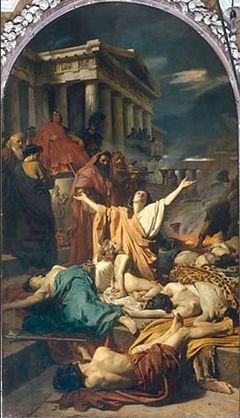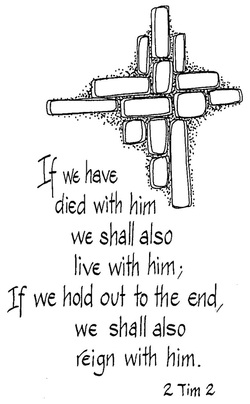 Often I have heard preaching on the story of the woman at the well (John 4:4-42) which portrays the woman as basically a “bad” person. A lot of assumptions are made in order to reach this assessment of her, and I’d like to propose some different assumptions. The woman, unfortunately we don’t know her name, comes to draw water at noon time. According to the practices of women of the day, this was not normal. Ordinarily women would draw water in the morning. All the women would be there about the same time before the heat of the day would set in, and we can imagine a bit of a confab, catching up with each other on what’s been happening in their lives. One theory about why this woman draws water at noon is that she is not welcome there at the same time as the other women (based on the fact, we learn later, that she has had five husbands and is now with a man who is not her husband). There are other possibilities though. Perhaps she was attending a sick person that morning and had to wait until one of the other women relieved her before she could go to the well. Perhaps she herself was not feeling well. Or, perhaps, she was late because she had a divine appointment to meet her Savior that day. While she visits with Jesus (alone!) he witnesses to her and then asks her to get her husband and bring him back. Here is where we find out, from Jesus, that she has had 5 husbands and the man she is currently with is not her husband. Is she a “bad” woman or a “fallen” woman because she has had 5 husbands? Not necessarily. Possibly one or two of those husbands died and the others divorced her. Even if all five of them divorced her, we don’t know why. But we do know that five men thought enough of her to marry her. There could be any number of reasons for a husband to put her aside, and one possibility is that she was infertile, something for which she would not be at fault. What we can say definitely is that she has known love, rejection and loss. So Jesus is once again ministering to someone who is hurting, and he has thoughtfully chosen to do this while his disciples were away and he could speak with her privately. Even though Jesus has told her everything she has ever done (v. 29), presumably both the good and the bad in her life, she doesn’t feel chastised or denigrated. Instead she is energized. So when the disciples return, the woman leaves her water jar to go back to town. That’s one excited woman who abandons her water jar at the well. She goes in to the village like a town crier and the people listen to her; then they follow her out to hear Jesus. If she were a disreputable woman, the people probably would not have listened to her or followed her out to hear Jesus. Again, I don’t believe this woman was an outcast or a “bad” person who drew water at noon because she was not welcome by the other women. I believe she was a hurting woman who had a divine appointment with Jesus, a man who proved to her that he was at least a prophet and possibly the Messiah. Yes, she is with a man now who is not her husband, but we don't know the circumstances that led to that decision. In the closing of the story, we learn that many Samaritans of that town believed because of the woman’s testimony; and many more believed because of Jesus’ own words. So, this woman, a Samaritan, not a Jew, married 5 times, hurt and rejected, became an evangelist to her town even before the disciples were able to recognize that Samaritans deserved to be evangelized. Jesus often chose the most unlikely people. What a divine appointment they had that day. For Reflection: Have I judged someone whose story I really don't know? Have I failed to recognize people who are hurting? Let us pray. Jesus, give me eyes to see people the way you see them. Give me patience to listen to their stories. Help me to recognize who they can be, not just who they have been. I need to remember that all are called to your kingdom.
0 Comments
 Three years pass for Elijah in Zarephath. While Elijah was hiding out in the home of the widow, King Ahab mounted a search to find this prophet who had cursed him with drought. In all the surrounding nations no one knew where he was. Meanwhile the drought continued and the famine worsened. Queen Jezebel's response was to kill all the prophets of God that she could find. King Ahab and his top adviser (and faithful servant of God) Obadiah were trying to save the country from disaster. They went out one day looking for any remaining grassland on which to pasture the animals. Ahab and Obadiah had gone in different directions when Elijah walked up to Obadiah, who recognized him, and said, "Tell the King that Elijah is here" (1 Kings 18:1-8). For Reflection: Sometimes the plans of God don't work quickly. While God waited three years for Ahab, King of Israel, to repent, Elijah cooled his heals in modern-day Lebanon. This time of resistance to God was not a fun time for anyone. Ahab and Obadiah had to deal with the drought; Elijah had to leave his country; most of the prophets of God were killed. Where I am today? Am I in the "waiting on God to work out his plans" stage? Or am I in the action stage of speaking to people who need to hear God's word? Is it possible to be in both stages at once? Let us pray. Only you know, Lord, only you know the times of my life, the ups and the downs. Don't let my heart be stubborn like that of Ahab or Jezebel. Help me to stay true to you like Elijah and Obadiah in times of waiting and times of action.  God has now worked two miracles regarding food for Elijah. First, he fed him through ravens in the wilderness. Second, he fed him through the widow of Zarephath. The third miracle related to Elijah, so far, is that God has withheld rain from Israel in order to prove to King Ahab that he is the one, true God. Elijah is biding his time, waiting for the next call from God, when the son of the widow becomes ill and stops breathing. The woman immediately blames this on Elijah. Why not? By now she knows that not only is he a foreigner but also an enemy of the King of Israel. Surely her housing of this man has brought this evil upon her (1 Kings 17:17-18). Elijah ignores the accusation and God uses Elijah to raise the boy back to life. This saving act, more than anything else, convinces the woman that Elijah's God is the true God and she has done the right thing by taking him in. "Now I know that you are a man of God and that the word of the Lord from your mouth is the truth" (1 Kings 17:24), is her confession of faith. The multiplication of food had not convinced her, but bringing her son back to life has. For Reflection: How many miracles does it take to convince me that God is at work? Let us pray. Lord, I can be so hard-headed and disbelieving sometimes. Help me to recognize you in my life every day.  When the brook dried up from which Elijah had been drinking (because of the drought which Elijah had predicted), God led him to a widow in a town on the coast (1 Kings 17:7-16). The widow and her son were also suffering from the drought. When Elijah asked her for food, she told him of her dire circumstances - she was preparing her last meal. Elijah asks her for bread anyway. Then he makes her a promise from God: "The jar of flour will not be used up and the jug of oil will not run dry until the day the Lord gives rain on the land." And so it was. Elijah lived with the woman and her family while God kept his promise. The widow was not an Israelite, but a woman from the area where Jezebel was from. God had sent Elijah to a foreigner, you might say into the enemy's camp, someone who owed an Israeli prophet nothing. For Reflection: God blessed this woman and her family for sharing their last meal with a visitor, a foreigner. Elijah had traveled a long way and was no doubt dusty and dirty. He'd been living outdoors for a long time without human companionship. A widow, who should have been afraid of him, takes him in. It is surely God at work to lead Elijah to such a woman and for that woman to open her home and hearth to Elijah. Let us pray. Jesus, if you led someone to my door I hope I would be as welcoming. There may not be anyone knocking on my door, but there are many refugees in the world today. How should I respond? What is my responsibility?  Many may be unfamiliar with the story of a Jewish woman who was forced to watch her seven sons be killed in the space of a single day. The story is told in 2 Maccabees 7 that the king was trying to force the family to eat pork. The account is extremely gruesome. But the mother is lauded for combining "womanly emotion with manly courage" while she spoke words of encouragement to each of her sons. She reminded them that it was God who created the universe and gave them life, that God was merciful and would reward them with eternal life. She encouraged them to their death. Lastly the mother died. For Reflection: For all the mothers who send their sons (and daughters) off to war. For all the mothers who offer encouragement in times of persecution. For all the mothers who receive back the wounded and the dead, let us thank God. Let us Pray. We do not know your ways, Lord, nor understand why some suffer so much for believing in God the Creator. But we thank you for the mothers who give life and encouragement to their families to keep to the laws of God. We entrust these mothers in their love and their sorrow to your care.  Two more brave women, largely unsung, figure into the story of Moses. Jochebed and Miriam were Moses's mother and sister. Since the Hebrew midwives wouldn't kill the boy babies when they were born, Pharaoh ordered all Hebrew women to throw their newborn sons into the Nile River. Jochebed didn't throw her son into the river. Rather she wove a small boat for him and placed him in the river where she knew he would be found by someone from Pharaoh's household. Then she posted her daughter Miriam as a watchwoman to see what would become of him. When Pharaoh's daughter found him and wanted to keep the baby as his own, Miriam bravely stepped up and suggested that a Hebrew woman nurse him. So Jochebed got to keep him for a few more years (Exodus 1:22-2:10). Jochebed, had to give up her son twice. First, when she put him in the river. Second, when she sent him to live with Pharaoh's daughter. She desired life for her son enough to go through all that so that he could live. Shiphrah and Puah had to stand up to Pharaoh and disobey his orders. Miriam, just a slave girl, had to speak to the princess of the land and make a suggestion. It took the courage of these four women to bring to life a man who would change the world. Without their tenacity, Moses's mission would not have come to fruition. For Reflection: What sacrifices or decisions have I made that I didn't understand at the time, but later realized they made a big difference in my life? When have I had to be courageous? Let us pray. Lord, I struggle to be courageous like Shiphrah and Puah, Jochebed and Miriam. I don't know that I could defy someone as powerful as Pharaoh if an unlawful order is made. Would I be as resourceful as Jochebed? As brave as Miriam? I don't know. Many Christians around the world today are under persecution as powerful as that of Pharaoh, Lord. Help me to stand with them in prayer at least. (Note: Many Christians will be standing in prayer for persecuted Christians in various nations on August 1. Won't you join us in prayer?)  How important is being mentioned by name? Often at the end of an event you hear thanks being given to those people who helped to organize it and who gave their time to make sure all in attendance were well taken care of. Rarely does the speaker have the opportunity to thank everyone by name. In Exodus 1, two women are mentioned by name. Because the Hebrew slaves were increasing in numbers and strength, Pharaoh became fearful of an uprising. He told the slave masters to work them ruthlessly. And then he ordered the Hebrew midwives to kill the baby boys that were born. But the midwives, Shiphrah and Puah, refused to do that. When Pharaoh discovered this, he summoned them for questioning. No doubt two slave women brought before the king were afraid, but they stood up to him and were spared their lives. Only two midwives were named in Exodus though it is more than likely that many midwives served the Hebrew women. Shiphrah and Puah were probably the leaders among the midwives and that's why they were brought to Pharaoh. And so they are mentioned in the account, like the organizers of an event, as a way of thanking them and their coworkers for their service. These women, who were not afraid to stand up for what they knew to be right, saved lives and entered the pages of history. For Reflection: We are all descended from a long line of ancestors. What courageous people do we have to thank for the gift of life? Who crossed a sea or fought a war or stood up to a king that I might someday be born? Let us pray. God, I thank you for Shiphrah and Puah and their bravery. I thank you for all of my ancestors - my ancestors in life and my ancestors in faith. I thank you for the few I know by name and the many whose names I don't know. I thank you for all those who struggled and persevered for my sake.  Now let's tackle the verses with which so many people have a problem. "Wives submit to your husbands" and "Husbands, love your wives" have caused much grief for wives who misinterpret them and husbands who can't live up to them (Ephesians 5:22, 25). Both commands are compared to how Christ relates to the church. Since Christ is the head of the church, the church, as the body of Christ, submits to the head. Christ loved the church enough to give his very life for her. These verses (5:22-33) are all of a piece. We can't separate one from another. The burden would seem to be heavier on the husband than the wife. The husband is to give himself up for his wife, to love her as he loves himself, to present the word of God to her, to help her become holy and blameless before God, just as he does for himself because in marriage the two have become one. Paul is, of course, speaking to two Christians married to one another. Then, if the husband does all of this, the wife need only respect and submit. She is not even, in this case, told to love her husband. Yet we know we are to love all people. A husband who can do all of the above is never abusive to his wife, nor demeaning. A wife, whose husband is this good, would never lose respect for him or have a need to nag. Will they argue sometimes or disagree about what is best for their union, their body? Yes. I'm reminded of a book I read recently which touched on the Civil War in the United States. I was constantly amazed at how far President Lincoln would go to maintain the union, the marriage if you will, among the states. He was tolerant of dissent and disagreement even among his cabinet as long as the goal was to save the union. For Reflection: If you are married, how strong is your union? What can be done to make it stronger? If unmarried, is there anyone who helps you grow in the body of Christ? How can you honor that person? Let us pray. God of mercy and love, unite your body more closely to you so that no part, no molecule, may go astray. Unite me more closely to you. Increase my love for my spouse. Increase my spouse's love for me. Unite us more as one in being with you.  (In honor of the kidnapped girls in Nigeria and their mothers.) Korea, early 1800s Cecilia's husband was killed by the authorities because he was Christian. Eventually she went to live with her son who was involved in dangerous missions work. Cecilia prayed for the success of her son's work and practiced a life of sacrifice so that others might eat. At the age of 79 Cecilia was arrested. The authorities demanded that she renounce her faith and tell them where her son was. She refused and was whipped repeatedly until she died with the names of Jesus and his mother Mary on her lips. (This account is taken from the May issue of Magnificat, an excellent resource for daily prayer and Scripture reading. http://www.Magnificat.com ) For reflection: Christians have been persecuted since the time of Jesus. Several times per hour, somewhere in the world, another Christian dies. Let us pray. Contend, O Lord, with those who contend with me; fight against those who fight against me. (Psalm 35:1) We ask you, Lord, to deliver the girls in Nigeria from their abductors without further harm and to release from prison all who are persecuted for their faith.  What else might we see or not see in the Kingdom? Paul mentions in his letter to the Galatians that "there is neither Jew nor Greek, slave nor free" (Galatians 3:28). If there are neither Jews nor Greeks, then religious and political divisions are gone. They are gone because all are "sons of God through faith in Christ Jesus, for all of you who were baptized in Christ have clothed yourselves with Christ" (3:26-27). In the Kingdom the only designation that matters is that we belong to Christ. We don't belong to a religion or to a country. We don't belong to someone else. We cannot be bought or sold or given to someone else because we belong to Christ. So there is no slavery, no bondage, no sex trafficking. There are no religious or political wars. All are equal and treat each other with respect and love. For reflection: This type of equality is difficult to imagine in our present situation where what country you belong to, or what religion you practice, or your sex determines much of your life. Let us open our minds to Christ, put on the mind of Christ, clothe ourselves with Christ. And imagine. |
AliceI started this website and blog on May 1, 2012. I am a Catholic who has been in ministry for many years. I first developed what I would call a close relationship with Jesus in the early 1970s. Ever since then I have been praying with people for healing and other needs. It is because I have seen so many of these prayers answered that I am so bold as to offer to pray for you individually through this website and phone line. Archives
July 2021
Categories
All
|
Proudly powered by Weebly

 RSS Feed
RSS Feed